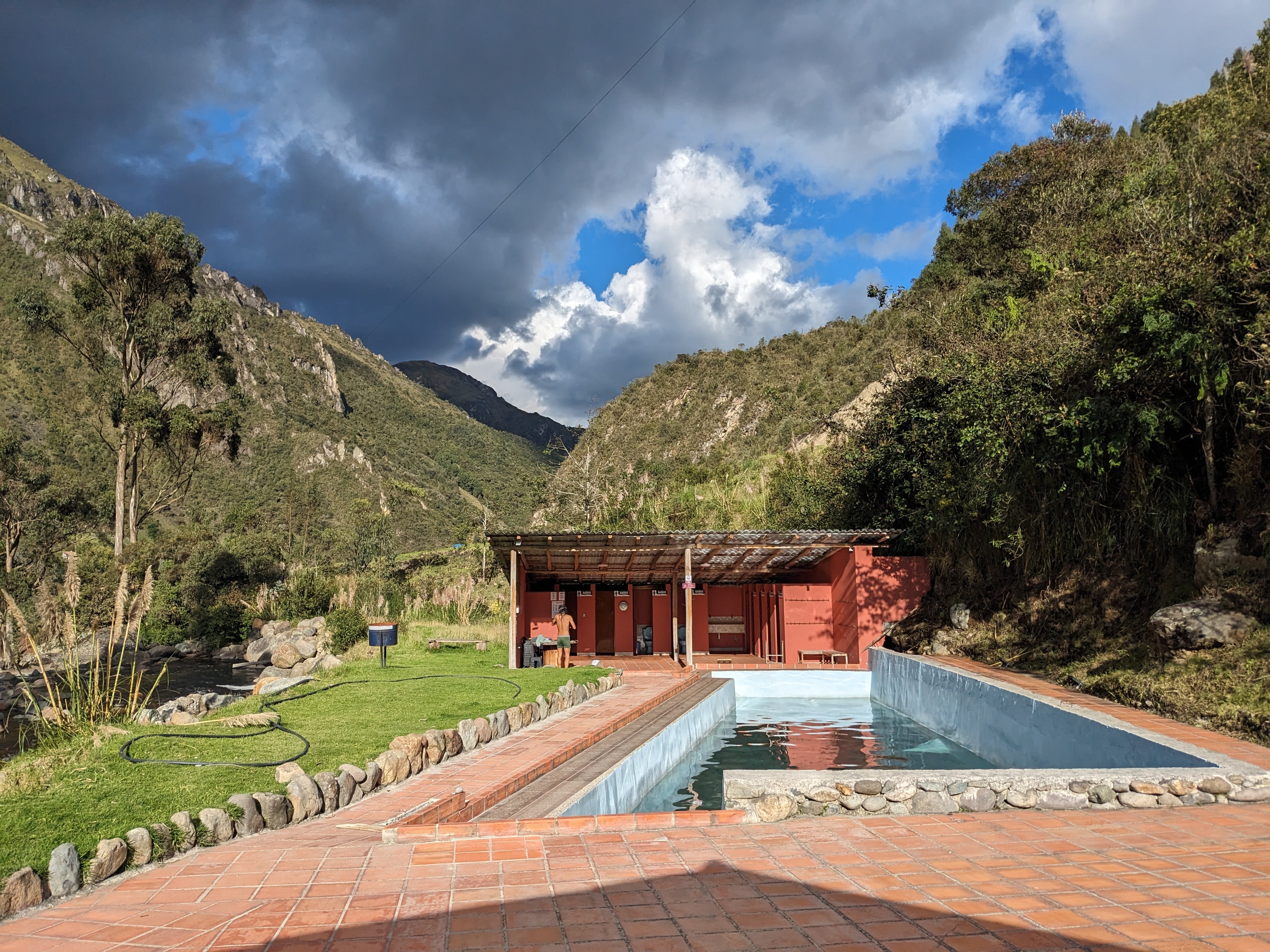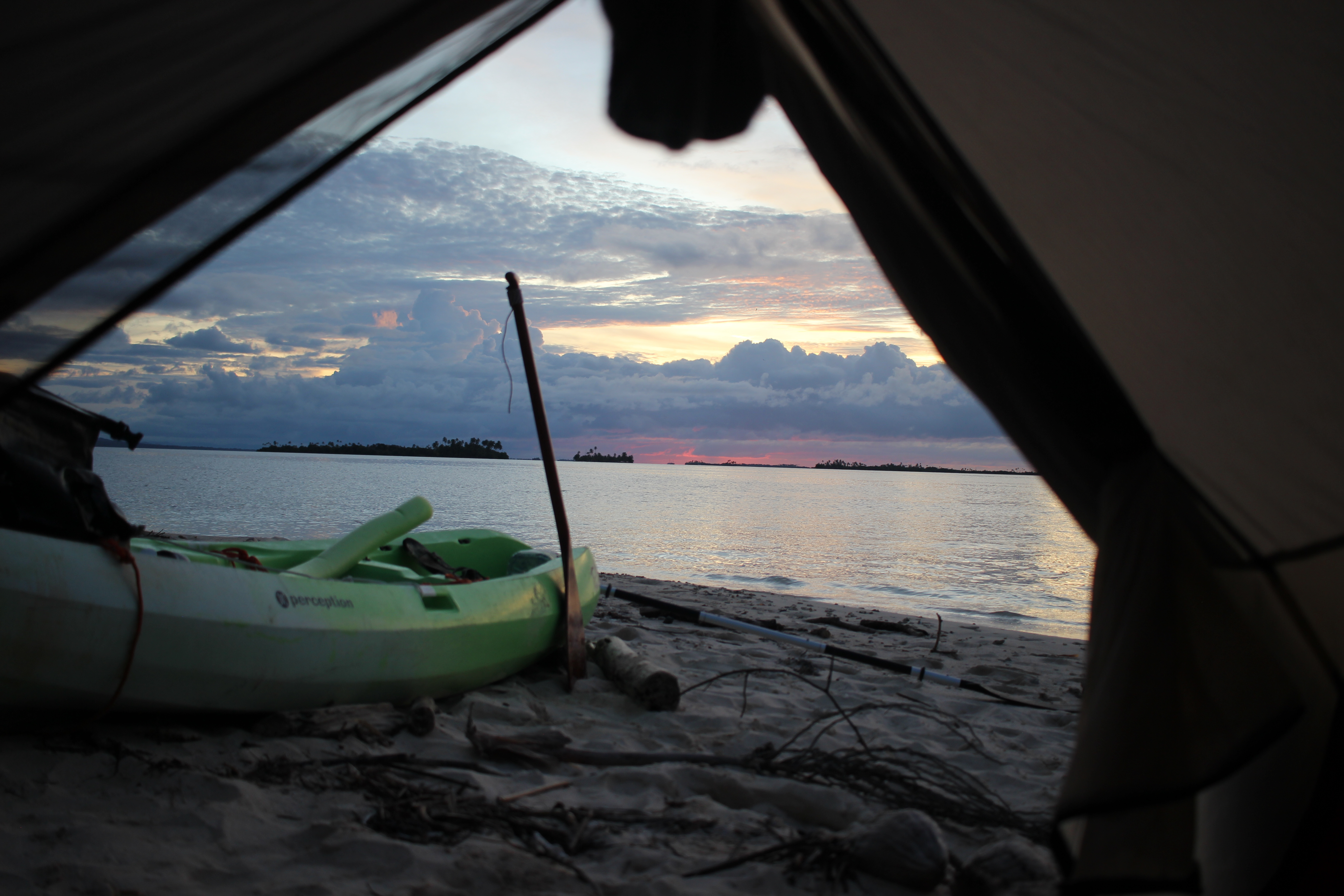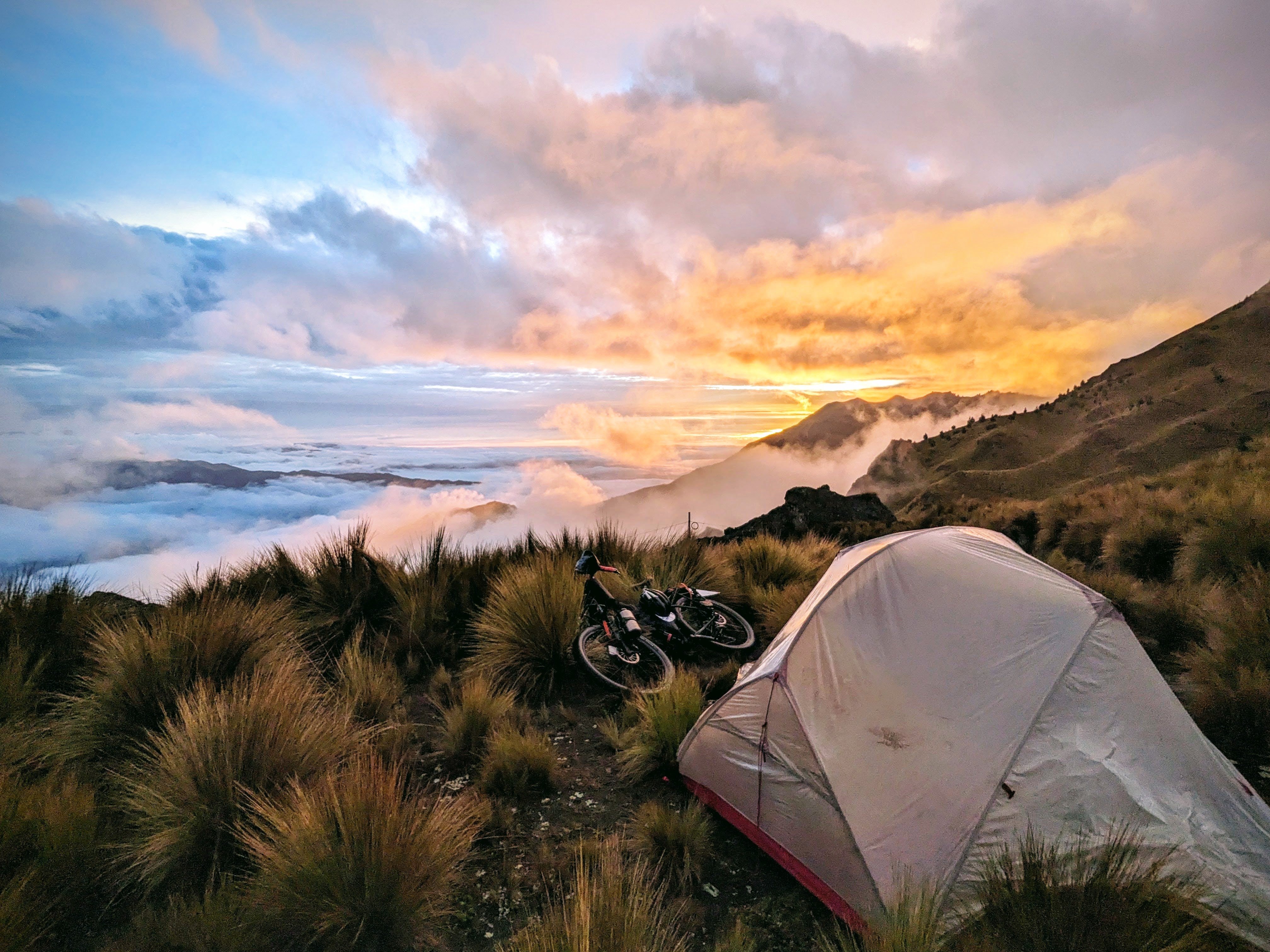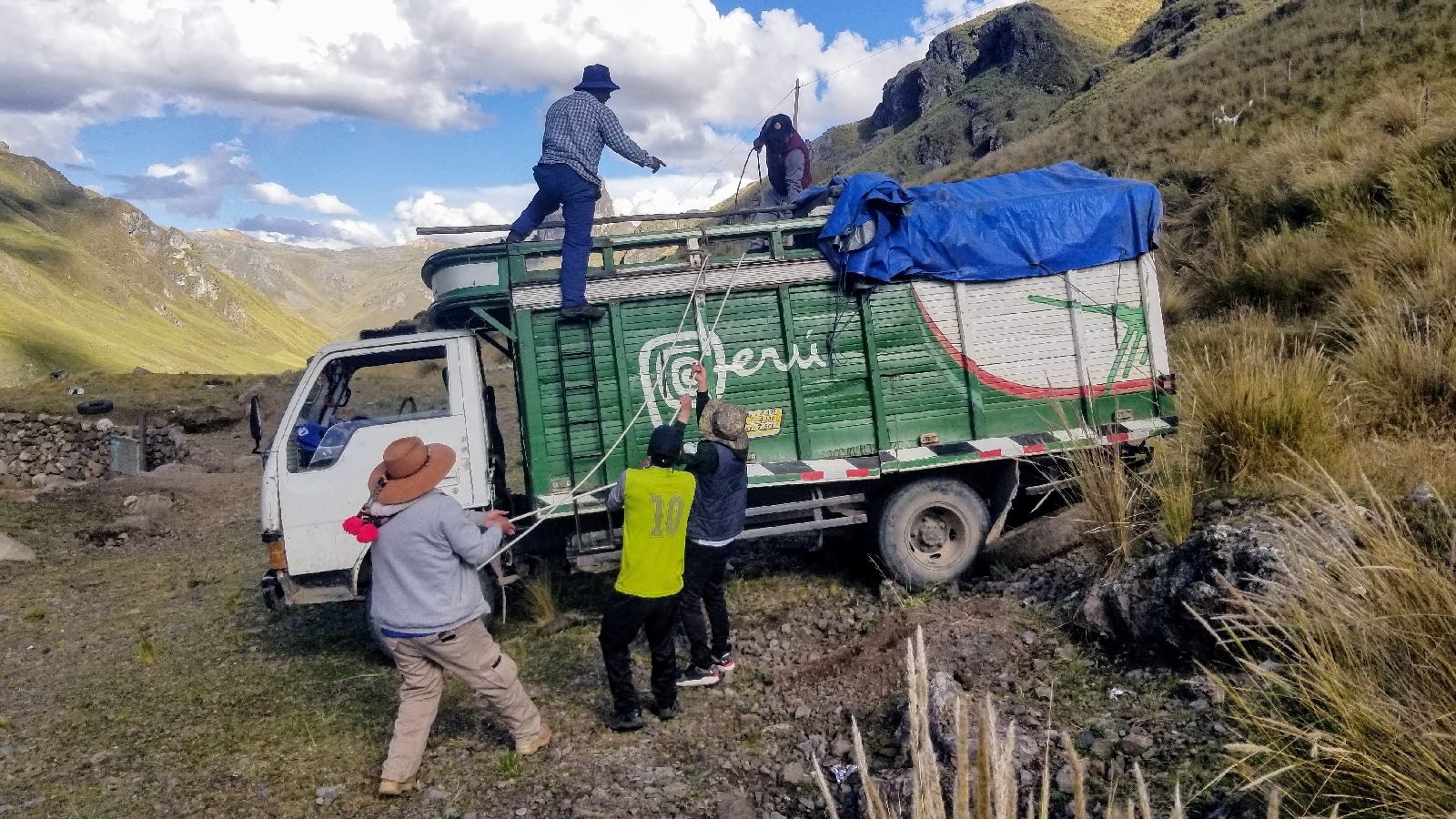Riding With Company
Northern coast of Peru.
Tatsuya.
Oregon, USA, 2022.
With kayak, Panama, 2023.
Some footage from southern Ecuador.
My Christmas was dampened by food poisoning. Thankfully, I had a comfortable place to rest in the Airbnb which my mother had rented.
We hung out with other touring cyclists, walked around Baños de Agua Santa, and I did bike maintenance.
My rear rack broke again, so I found an aluminum welder and he reinforced both sides.
Hopefully it will last this time. If it breaks again, I want to get a new, steel rack.
My dynamo hub had developed play, and I decided to return it for a refund and no longer use a dynamo. The airline wouldn't let my mom bring the new wheel parts I'd bought online, so I bought a whole new wheel here in Ecuador.
31 December 2024 Day 415
A NYE tradition here is crossdressing for tips. These kids are blocking the road and dancing until they get a tip from the motorist.
Another NYE tradition here is burning painted dolls and figures.
This is choclo:
A small cob of corn with large kernels. Boiled, and served with fresh cheese and a peanut sauce.
01 January 2024 Day 416
The aftermath of a lively NYE party was apparent - drunk people laying about (some still drinking), smoldering remains of the painted dolls, and shops still closed.
I decorated my spokes with this charred ace of clubs. A symbol of the new year.
03 January 2024 Day 418
He said a prayer before picking up his utensils, and then devoured his braised ribs twice as fast as me. Afterwards, he said another prayer, and demonstrated how to stick a gemstone to your forehead as a third eye, while explaining higher levels of consciousness.
05 January 2024 Day 420
I went to an archeology site. The Incas happened to be ruling much of South America when the Spanish arrived. They didn't have guns, germs, steel, or horses, but they were still fierce conquistadors in their own rite.
The Incas had overthrown much of the Cuñar tribe 150 years before the Spanish arrived. This archeological site was started by the Cuñar group, and later used by the Incas for military, religious, and political purposes. There was one Cuñar communal tomb centered around a female skeleton, which let historians to postulate that it was a matriarchal society.
06 January 2024 Day 421
CUENCA
In Cuenca, Ecuador I met up with several other cycle tourists:
Eddy says leaving on his bike trip was the best decision of his life. He grew up in the Seattle area but has lived in Hawaii recently. At his job in Hawaii, when he started to lose his hearing, they offered to either retrain him (presumably for a position that didn't require much listening), or let him retire. So he retired and gets some sort of pension and social security, too. He had enjoyed cycling for 18 years but hadn't gone on a long trip before. He says it was YouTube videos which inspired him to make this trip happen. After lots of thought he sold most of his stuff. Including his waterfront Hawaii condo. People said he was crazy for selling to condo, but he didn't want to worry about renting it, and he has no regrets. Now he's cycling the world.
Eddy knows he doesn't want kids and knows he doesn't want to get married. He just doesn't want to be a part of that. He's seen a lot of his peers get divorced and remarry young women and he says it really never works out.
Eddy, Debs, Tom, and I hiked up to a viewpoint over Cuenca and saw a three kings day celebration:
Cuenca appears to be doing well. The city is clean and has decent cycling infrastructure. I went to a free planetarium show, enjoyed full-width sidewalks and potable tap water. People obey the traffic signals, and everyone seems to have a roof to sleep under at night.
Debs squeezing a lime at a Mexican restaurant in Cuenca, Ecuador. Delicious burrito, but it didn't remind me much of Mexico.
From experience, Mexican food in the USA is often more authentic than Mexican food in central or south America (except possibly northern Guatemala). My theory is that Mexican food and restaurants in the USA are often operated and/or owned by first or 2nd generation Mexicans. But there aren't very many Mexicans migrating south to carry the food culture with them.
Debs bought a new sleeping bag, and gave me the old one to leave at the hostel where I was staying. I gave it to the receptionist, Nahir.
Nahir and I ate popcorn and played Jenga that evening. She's from Argentina and has cumulatively spent 5 years travelling around South America. She travels by bus and works in restaurants and/or hostels while she travels.
_____________
Unfortunately a high profile prisoner escaped from a prison in Guayaqil, Ecuador a week ago and they just noticed. They haven't found him yet and guards have lost control of various prisons across Ecuador, including the one here in Cuenca. The president declared an "internal armed conflict" (experts say this is essentially a civil war declaration) and there is a curfew for security. How will this affect my travel plans?
Debs and Tom were worried that the situation would rapidly deteriorate, so they took a taxi to the Peru border.
I decided to keep cycling, and left Cuenca a few days later with Tatsuya, the Japanese cyclist I met a week prior.
We left Cuenca in search of a yoga retreat Tatsuya heard about. The entrance to the property was gated, and nobody answered the bell, so we searched for camping and found some hotsprings:
Tatsuya and I got along well and fell into a nice rhythm. I cooked dinner for us both because Tatsuya didn't have cooking equipment, and Tatsuya bought me lunch.
Tatsuya moved to the US when he was 12 (I think). He served in the US military in his 20s and went back to live with his parent afterwards. He wasn't doing so well after his time in the military and after over a year unemployed, his parents kicked him out of the house. He doesn't talk much with his family anymore.
Several of my peers have joined the military. I think the appeal is comradeship, adventure, sense of purpose. It's a good sales pitch for someone who graduated high school, their friends left town, they lack inspiration in their life, itch for adventure, and want to be a physically fit superhero.
Joining the military is one of the least free ways to live as a US citizen. You need to be in a certain place at a certain time with certain people, and you're expected to do certain things. Including possibly kill someone, or get killed. And you don't get a say in any of it. And if you want to quit, you're in big big trouble.
Many of Tatsuya's comrades in the military had immigrated to the US and used the military as a path towards citizenship.
With my bicycle, I can go anywhere in the world, under my own power, on my own schedule. The only restrictions are money (this is an inexpensive lifestyle), visas/diplomatic issues, and the fact that bicycles are relatively slow and physically effortful. This is a profound freedom.
Nahir (the Argentine backpacker/receptionist from Cuenca) and I had kept in communication. She seemed pretty adventurous, so I asked if she was interested in bike touring with me. I offered to help her find a bike, share my group equipment (cooking, tent, tools) and carry the food and water. Surprisingly she was willing to give it a shot.
So she took a bus to Loja, where Tatsuya and I were.
We discussed traveling as a group of three, but Tatsuya decided to continue alone. Tatsuya wanted to leave Nahir and I alone, and I felt bad for effectively third-wheeling him. I'll miss Tatsuya and hopefully we can meet again someday.
Nahir bought a bike and racks for $80 and we rolled out of Loja two days later.
Buying a bicycle.
Nahir cooking at a free campsite in Loja, Ecuador.
Expectedly, my bike touring style changed completely. Together, we rode about half the time, a third the distance, or a fourth the elevation gain that I do alone. We stuck to the main highway and avoided wild camping (alone, I do the opposite). After a year in relative solitude, I was suddenly spending every minute with someone.
(My phone broke, so I have no pictures from the next few weeks.)
Of course this was a much bigger change for Nahir than it was for me. This was her first bicycle trip.
But Nahir feels at home travelling in South America. Of course, she's a native Spanish speaker (I can't overemphasize how important that is). She was really good at tracking down bathrooms, Wifi, showers, camping, specific foods etc. We camped with water access almost every night. And her cultural knowledge gave me the confidence to try playing my recorder in churches (when they were mostly empty). By the way, churches have excellent acoustics for a recorder.
_______________
Ignoring the internal armed conflict, we slowly cycled towards Huaquillas, Ecuador, the border town on the coast. I wanted to stay in the mountains, but Nahir really wanted to cross at the coastal border for reasons related to her immigration status.
Sometimes Nahir would hitchhike up the big climbs. This worked well for both of us because it gave me a chance to get some exercise and Nahir didn't have to spend 4 hours pushing her bike up a 700 meter hill in the humid heat.
At the border, I asked the Peruvian immigration officer politely in my best Spanish for 180 days (they usually only give 90 days). They gave me 150 to stay legally in Peru! This was a huge win.
Cycle touring along the northern coast of Peru wasn't great, but it was really more about spending time with Nahir than about the road quality or scenery. There were some nice beaches, though.
Nahir was travelling in Ecuador when the pandemic began. Back in Argentina during the pandemic, she went to some sort of regular community circus convention. She learned how to juggle really well and can juggle machetes, pins, or four balls. But the pins are her favorite. Later, she actually worked for a circus in an administrative position.
Nahir also went to culinary school, and has worked a lot in high-end restaurants and bakeries.
Biking together, we ate very well, but my minimalist kitchen (a pairing knife, one pot, and a stove whose simmer setting involves a broken tin can) was less tham she was used to.
Inland, Nahir and I and found a volunteer opportunity at someplace called Porta Verde. It was at was a private landholding with a sports fields, a pool, a restaurant, and music. You could pay a small fee to camp there, but we volunteered four hours per day in exchange for access to all the services.
There was a Venezualan couple there, also travelling by bike, who had left from Medellin, Colombia eight months ago:
Lenin went to culinary school and was always handing me plates of delicious food or a joint. He knows a lot about world history, and also a lot about American/western pop culture. I heard him listening to music from Aphex Twin and Alice in Chains, which is suprising, because Latin/local music is so dominant in Latin American. Financially, Lenin and Endrina get by working at places like Porta Verde, and by selling handicraft "artesanal" things, such as wrapped wire bracelets, wrapped wire gemstones, bead bracelets and jewelry, and hand painted bags. I helped Endrina translate her sales pitch into English.
The economic crisis in Venezuela has led to a mass exodus. In Colombia, Ecuador, and Peru, there is strong anti-Venezuelan sentiment. Many people use the term "Venezuelan" almost synonymously with "theif" and "criminal". Surely, displaced and desperate individuals are more likely to resort to crime. But the level of anti-Venezuelan sentiment seems unjustified at best.
Because of anti-Venezuelan sentiment, Lenin and Endrina present as though they are from Colombia.
_______________________
Eulogy:
After 500+ nights in my MSR Hubba Hubba tent, I decided it was time for a new tent. The rainfly was duct taped in several places, I had replaced the zippers in Mexico City, duct taped the tent body, floor, and ground cloth, changed the rainfly zipper pulls, changed the shock cord, and fixed three broken poles. After fixing another broken pole, two more poles broke as I was setting it up again. This time, one broke at a triangular junction which would be really hard to fix well. So I finally said goodbye to the last piece of equipment that I've used on all my bike trips. Nahir and I went to a Home Depot-style hardware store and bought a new tent for $50.
Ode to my old tent:
Kansas, USA, 2018.
Floating in a lake, Ontario, Canada, 2018.
Oregon, USA, 2019.
Oregon, USA, 2019.
Idaho, USA, 2020.
Oregon, USA, 2022.
In the middle of the road. Oregon, USA, 2022.
Oregon, USA, 2022.
Kansas, USA, 2022.
Virginia, USA, 2022.
A very cold night. Featuring Curtis. Oregon, USA, 2022
Nevada, USA, 2022.
Baja California, Mexico, 2023.
Mexico, 2023.
Oaxaca, Mexico, 2023.
Next to a guard station, near the Mexico/Guatemala border. 2023.
Nicaragua, 2023.
In the jungle. Costa Rica, 2023.
Deserted island with kayak, Panama, 2023.
At 3800 meter (12600 feet), Colombia, 2023
Colombia, 2023.
On someone's porch, Colombia, 2023.
Rare, precious wild camping in Colombia, 2023
At 4000 meters (13,300 feet), Ecuadorian Andes, 2023.
Ecuadorian Andes, 2023.
I've pitched the tent in front of an auto parts store in northern Colombia. On a deserted island on the Caribbean coast of Panama. On a glacier on Mt. Rainier. Hidden in the bushes of an abandoned road in San Diego, California.
I've pitched my tent at churches and police stations and gas stations and soccer fields throughout Latin America, thankful for three square meters of personal space.
The tent is a weather barrier, animal protection, and privacy. Its walls, blood-stained from popped mosquitoes, are my familiar home in a constantly unfamiliar world.
_______________
Nahir found paid work and a spare room to sleep in at Porta Verde. After a week at Porta Verde, I left Nahir behind and kept cycling alone. We miss eachother and may meet again someday.
































































Your photographic 'eye' has continued to develop. Some wonderful shots. Stay well, Nanu
ReplyDeleteThanks!
Delete